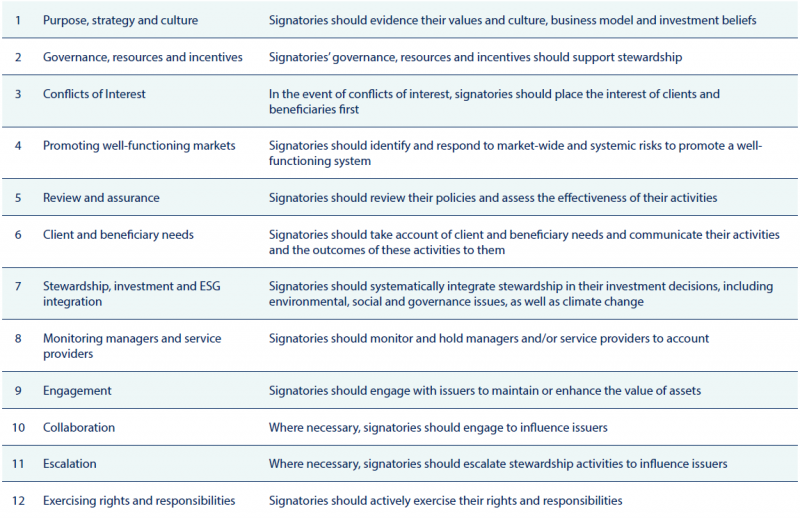
Introduction
Investors are becoming increasingly focused on the environmental, social and governance (ESG) challenges affecting their portfolios. Asset managers are therefore under pressure to demonstrate that they are good stewards of capital whilst keeping these challenges in mind. In 2020, the Financial Reporting Council (FRC) updated the UK Stewardship Code, imposing more stringent ESG requirements on its signatories. The updated code requires signatories to provide evidence of their stewardship activities and their approach to integrating ESG in investment decisions across asset classes. This means signatories are required to consider how to exercise stewardship with regard to fixed income, property and alternatives.
The code aims to:
- increase the transparency of ESG integration within investment decisions
- increase the accountability of asset owners, asset managers and their service providers regarding ESG standards
- promote the role of asset owners, asset managers and their service providers in safeguarding market integrity and minimising systemic risk
The code emphasises 12 principles1 and requires organisations to demonstrate how they integrate these principles within their business models:

Implications for Asset Managers
The UK Stewardship Code 2020 aims to adopt a ‘show me’ rather than ‘tell me’ approach, imposing more onerous reporting obligations on its signatories, and requiring them to demonstrate their progress. An estimated 34% of signatory applicants were rejected in the first half of 2021 through lack of sufficient evidence of adhering to all the principles or failing to address them2.
Cantab Asset Management’s Stewardship and Engagement Policy
Cantab’s policy is to hold investment managers to account for their actions and to act in the best interest of clients. We contact each of the asset managers we invest with on an annual basis to ensure that they are complying with our governance requirements at a company level and in their investment approach. We require asset managers to provide an annual attestation of compliance for each fund in which we invest to confirm it continues to operate in line with its investment objectives. This includes a request for details of their latest Stewardship Code engagement and ESG policy as well as details of any material events and compliance with regulatory requirements. Failure to complete the attestation would lead us to reconsider our relationship with the manager and take appropriate recourse through our investment committee.
The Cantab ESG questionnaire for multiple asset classes introduces additional scrutiny on asset managers. The questionnaire is split into two sections with the first focusing on the asset manager business and its attitude, capability and implementation for investing responsibly. We ask managers about their ESG team resource and whether they incorporate climate change into decision making. The second section focuses on the engagements and votes made between the asset manager and its underlying investments at a fund level. It is this more granular information that will allow stakeholders to contextualise the approaches of asset managers in relation to their own circumstances. Reporting on voting and engagement is clearer for listed equity managers whereas currently, reporting approaches on good stewardship in fixed income funds is relatively limited. We expect our asset managers to begin reporting on the Financial Stability Board’s Taskforce on Climate-related Financial Disclosures (‘TCFD’).
Conflicts of Interest
We recognise the importance of identifying and effectively managing potential conflicts of interest arising in the course of business. Our Conflicts of Interest document sets out our policy for managing such conflicts. Regarding Stewardship at a company level, Cantab’s Equal Opportunities Policy and Modern Slavery Statement were approved by the Board and affirm Cantab’s commitment to social well-being. Cantab’s support for charities has been endorsed by inclusion of a contribution in the annual budget.
Voting
Where we hold units in funds rather than shares in underlying companies, we have effectively delegated voting responsibility to the asset managers and so our priority when investing is to ensure our asset managers have a coherent voting policy in place. We expect asset managers to vote in line with their documented voting policy. Where we hold direct equities in funds that we manage, we use Broadridge’s ProxyEdge platform to implement our votes as instructed by Cantab. We do not use proxy advisors, preferring to conduct our own assessment when making voting decisions and we do not disclose voting activity. All our investee companies are monitored as a natural and ongoing part of our investment process.
1 Financial Reporting Council (October 2019),“The UK Stewardship Code 2020”
2 Financial Reporting Council (September 2021) “FRC lists successful signatories to the UK Stewardship Code”
Risk warnings
This document has been prepared based on our understanding of current UK law and HM Revenue and Customs practice, both of which may be the subject of change in the future. The opinions expressed herein are those of Cantab Asset Management Ltd and should not be construed as investment advice. Cantab Asset Management Ltd is authorised and regulated by the Financial Conduct Authority. As with all equity-based and bond-based investments, the value and the income therefrom can fall as well as rise and you may not get back all the money that you invested. The value of overseas securities will be influenced by the exchange rate used to convert these to sterling. Investments in stocks and shares should therefore be viewed as a medium to long-term investment. Past performance is not a guide to the future. It is important to note that in selecting ESG investments, a screening out process has taken place which eliminates many investments potentially providing good financial returns. By reducing the universe of possible investments, the investment performance of ESG portfolios might be less than that potentially produced by selecting from the larger unscreened universe.


